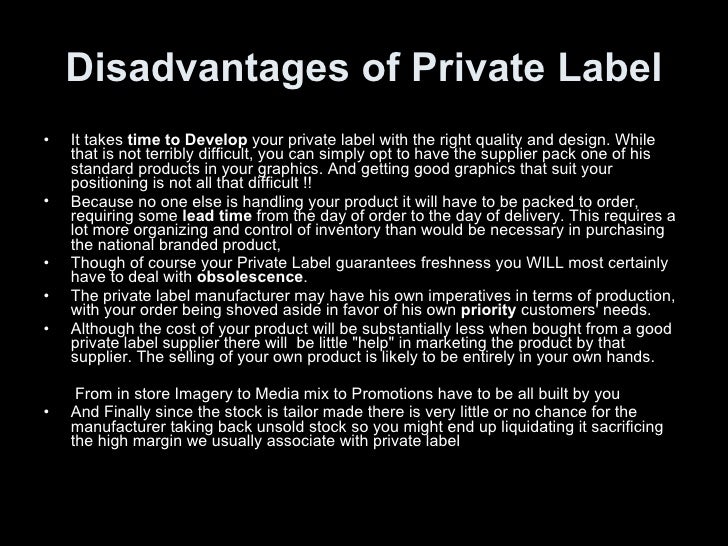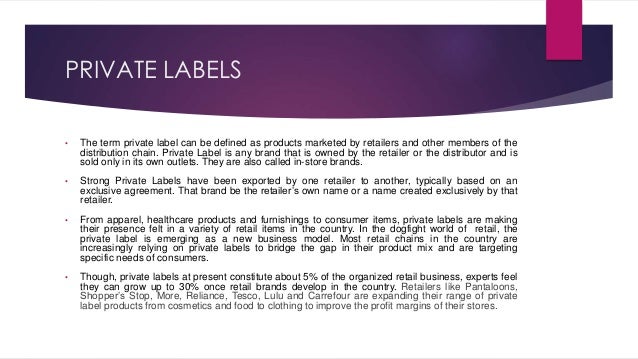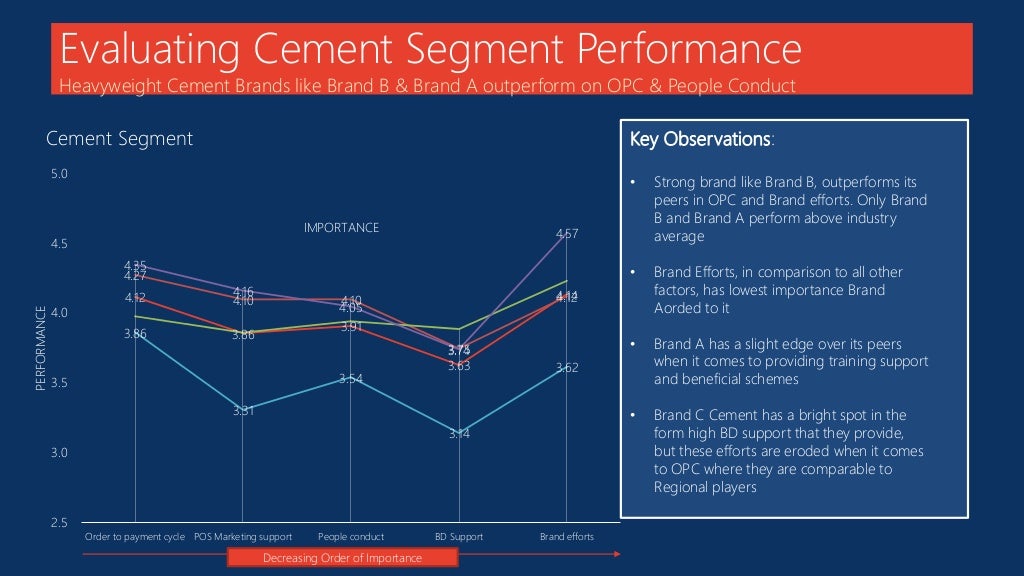43 private labels vs brands
Private Label vs. Branded Products: Pros and Cons | Sourcify When you purchase your products from a manufacturer and then put your logo on them before you sell, you have a private label. Doing business this way can lower product unit costs and lead to higher profit margins. Another great upside of using a manufacturer is that you can determine the quality and exact specifications of your products. Brands vs Private Labels — Stone Candles And the main difference between recognized brands and private label brands is probably their prices and variety. This is one of the reasons why private label products are having a surge in popularity these days. Since private-label products do not necessarily have a "name" or brand, they are significantly cheaper than branded products.
"Private label vs. consumer brand: the competition for shelf space" Private Label vs. Consumer Brand: The Competition for Shelf Space will explore the changing dynamics and challenges of traditional consumer brands as they face off against private label to win the ...

Private labels vs brands
12 Pros and Cons of Private Label Brands - BrandonGaille.com Private label brands are usually cheaper than other branded products. This is because customers don't have to pay for mass marketing campaigns and the other costs national brand items may face. Local products coming from local producers also typically have lower transportation costs. This doesn't mean every private label brand is cheaper ... Private Label vs. National Brands | Blacksmith Applications Private label brands exist across products and price levels. Impact: Pricing promotions that once made national brands cost competitive to private label items, may drop its product into a separate tier where the lower price intended to drive volume becomes the consumer expectation for everyday price. ♦ Challenge #2 ♦ A Race to the Bottom Private Label VS Brands: How To Make The Most Of Both 3. Across all price points Retailers can carefully use their branded and own label offers to cover all prices and bases in any given category. Whilst a brand might have a more premium, aspirational appeal, it leaves room for lower and medium priced, quality own label brands to sit just below them on the pricing ladder. 4. Less is more
Private labels vs brands. What is the difference between private label brands and in ... - Quora Answer (1 of 3): There is a common misconception about the difference between private label brands and in-house brands. Usually, the manufacturer sells their products to customers through distribution channels. Earlier retailers as well as wholesalers sold only these products to the customers. T... Private labels to stay 'formidable competitors ' to the brands ... Private label loyalists (shoppers that buy them over 75% of the time) now equal those of national brands in all key European markets, claims fresh IRI data. Private labels account for €194 bn, making up 35% of total FMCG value sales in Europe as the gap narrows between national brands, the researcher revealed. The Pros and Cons of Going 'Private Label' vs. Selling ... - Sourcify When you purchase your products from a manufacturer and then put your logo on them before you sell, you have a private label. Doing business this way can lower product unit costs and lead to higher profit margins. Another great upside of using a manufacturer is that you can determine the quality and exact specifications of your products. "Private Label vs. Consumer Brand: The Competition for Shelf Space" Private Label vs. Consumer Brand: The Competition for Shelf Space will explore the changing dynamics and challenges of traditional consumer brands as they face off against private label to win the wallet and minds of organic consumers, as part of the second announced educational session at Organic Produce Summit 2022.
What is Private Labeling? [Definition, Pros, Cons & More] The long-standing brand names have advantages over your private brand. You'll find them in a broader range of stores - whereas your private label lines will only be on your shelves. Plus, a national brand or intentional brand will always have a bigger marketing and promotion budget. Minimum Order Quantity (MOQ) The battle for brands in a world of private labels - Deloitte Insights private labels represent 20 percent of grocery store and 18 percent of supercenter sales. 4 furthermore, store brand products were 31 percent cheaper across product categories than their national brand counterparts. 5 store brands are not just a recession related phenomenon - u.s. store brand sales continue to grow over the long run despite … Private "Label" vs. Private "Brands" - David J. Katz - The Alchemist Private label merchandise is generic goods, sold as a commodity (and commodities have price as their value proposition). Private brands, when properly executed, are truly brands, exclusive to a retailer or channel of distribution, with distinct brand attributes, supported by significant marketing. Private Label vs. National Brands | Catalina Private Label vs. National Brands | Catalina Shopper Insight Private Brands Outpacing National Brands on New Products; Price Gap Decreases in 2021 Catalina looks at retailer Private Brands' new product strategy during the pandemic and compares it with Name Brands investment in key categories. Download
Private Label vs. Consumer Brand: The Competition for Shelf Space Private Label vs. Consumer Brand: The Competition for Shelf Space will explore the changing dynamics and challenges of traditional consumer brands as they face off against private label to win the wallet and minds of organic consumers, as part of the second announced educational session at Organic Produce Summit 2022. Name brands vs private label: It comes down to packaging "Shoppers realize that name brands no longer guarantee better quality and there is a significant decline in the gap between private label and brand name over the past few years. When it comes to differentiating the product itself, packaging might be the only thing left for name brands to stand out. Private Label Products Vs Name Brand Products - Bay Tech Label Private Label Sales Chart You can see from the private labels chart above that consumers are spending 37% of their money on the generic brands in 2016. While discount store brand products are still the majority of store brand sales, the have fallen 2.8% in the past three years. Private Label Versus Brands: How Retailers Can Make The Most of Both Very good brands have strong ties with their customer base and woe betides anyone that gets in the way. Equally the consumer is also far more open now to own and private label brands and if anything would like to see more choice, differentiation and see the retailers bring their flair and imagination to a heavily branded category.

onesixthscalepictures: CM Toys Private Military Contractor (PMC) : Latest product news for 1/6 ...
What Is Private Label?: White Label vs. Private Label A private label brand is a business devoted to creating products that third parties can sell as their own. They don't market, brand, or retail any of their own goods. They are focused solely on manufacturing products that are sold to other companies, who sell them to other businesses or consumers.
Brands versus private labels: Fighting to win | Bain & Company On one hand, manufacturers are right to be concerned: There are more private labels - "store-brand" goods - on the market than ever before. Collectively, private labels in the United States command higher unit shares than the strongest national brand in 77 of 250 supermarket product categories.
Private labels versus brands | GlobalPETS Private labels have also been used to take a stand against powerful brand owners and to increase profits. Supermarkets often attract customers through offering leading brands at highly competitive prices. Margins on such brands are, therefore, often low. Establishing a private label enables supermarkets to generate a higher profit margin.
Private Label vs Branded Products: 6 Insights You Can Use Consistent branding and well-thought-out marketing are what underlie branded success - and will, therefore, be central for private label brands as well. TraQline helps you inform your marketing strategy with consumer insights, behaviors, and trends. This customer insight will help you build your brand and reach your target market.
Brands Versus Private Labels: Fighting to Win In fact, a 1994 DDB Needham survey indicates that 60 % of consumers still agree that they prefer the comfort, security, and value of a national brand over a private label. Although this percentage...
Brands vs. Private Labels: Fighting to Win | Harvard Business ... How real is the private-label threat to branded products? What should national-brand manufacturers do about it? On the one hand, manufacturers have reason to be concerned. There are more private labels on the market than ever before; collectively, unit share of store-brand goods place first, second, or third in 177 of 250 supermarket product categories in the United States. But many ...
Private Label: Six key strategies for brands to compete Today private label often isn't 'private label'. Retailers create brands (or at least brand names) to create the illusion of exclusivity, and perhaps to create something that might appeal to ...
Private Label (Generic) vs. Branded Products: Differences Aren't Black ... Private label products, otherwise known as store brands or retailer brands, can be found at a wide variety of retailers. Some private label products, which includes everything from pet food to aspirin, are much more obvious than others. The major improvement in packaging was the first step in the success of private label.







Post a Comment for "43 private labels vs brands"